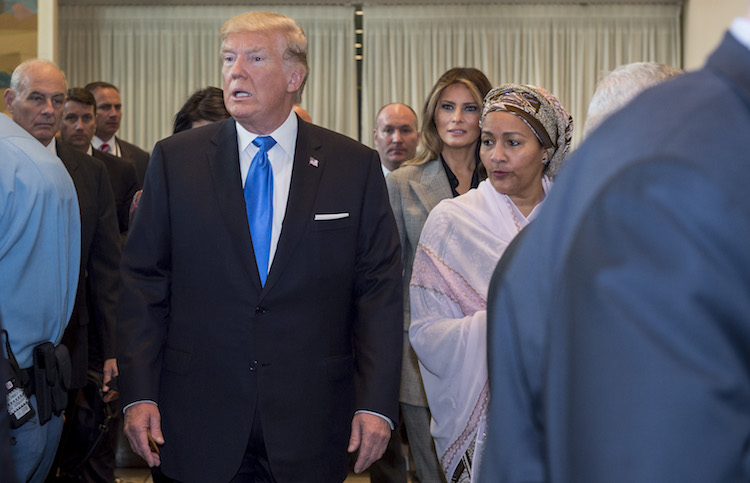Viewpoint by Hugh Dugan*
The author is Visiting Scholar at Seton Hall University’s School of Diplomacy and former senior advisor to eleven U.S. ambassadors to the United Nations.
NEW YORK (IDN) – Many globalists feared last week the arrival of ‘Hurricane Donald’ unleashing its wrath on the United Nations at its annual opening session. In the end, it was downgraded to a tropical storm affecting only North Korea and Iran.
Trump’s tone and body language, which was all that his critics were prepared to dissect, were one with the script he revised up to the last minute. Much to their surprise, in fact he did not call to drain the UN swamp. And he opted against twitterizing the place as the “Deep UN”. Few came up with much to dislike, other than a few words meant to draw headlines.
While echoing previous U.S. Administrations’ prescription for UN reform, what else didn’t Trump say? He did not threaten withholding U.S. payments to the UN in exchange for more efficiency and effectiveness in the UN’s work program or other carrot-stick rhetoric. That U.S. tactic, used every fifteen years or so, was otherwise due for a reprise.
Yes, Trump did call for a more equitable burden sharing, but it in no way rose to his shrill purse-tightening warnings hurled at NATO early this year. He could easily have done so mindful of his political base at home and echoing Senator Lindsay Graham’s call to withhold all U.S. payments to the UN in the wake of last December’s Security Council condemnation of Israel. No, Trump opted to respect the gathering as one of international statesmen, not of politicians exploiting the UN platform.
His familiarity with the UN as a New Yorker was that of a real estate developer publicly spurned when his business offer twenty years ago to renovate the entire complex was rebuffed in favour of a highly political, inefficient, and expensive bidding process. Coupling that with last December’s Security Council condemnation of Israel, the UN did not hold his fascination.
However, he actually said very little about the UN in his first months, leaving his critics with nothing but his tone and body language to infer a disdain for the UN and by extension most things international. Starving them of their imagined fears, Trump invested the talented political capital of Nikki Haley to serve as his Ambassador there, and a few months later courted the Security Council to lunch and discussion in the Oval office – something his predecessor had not done over eight years. Trump said to them that while he was a numbers guy and wanted value for America’s UN dues, positive results from Turtle Bay would build that value and probably higher U.S. regard and support in the future.
Two Security Council votes later, to sanction North Korea, have made a visible impact on Donald Trump’s regard for the utility of the United Nations Organization. For a businessman, value is a driving agent and will eclipse earlier feelings or inattentions.
In his speech Trump deftly reminded that a country that puts its people first is a shared phenomenon worldwide, except for oppressive regimes such as Iran and North Korea. He underscored that a healthy nation state responsible in the first interest to the rights and needs of its people is all the better an international citizen.
It is only but a step to connect this view to the UN doctrine of Responsibility to Protect. Under the R2P, the UN has authorized actions targeting regime change in certain places. Was Trump’s speech but a prelude for a future call to the UN for invoking R2P in the Iranian or North Korean theatres?
While his Russian, Chinese and German counterparts stayed at home sitting in the shadow as North Korea continues to burst forth, Trump attended the UN General Assembly’s opening debate with his A team. Unlike any previous President, he arrived a day early to host a major event to support UN reform initiatives which the Secretary-General is elaborating at member states’ instruction.
This extra contribution to publicize the UN was innovative and represented an investment by businessman Trump in an international resource for supersizing American foreign policy priorities. Unlike previous projects, he did not raze this structure to build a heavily branded statement of skyline bravado. He found more inside of potential than did Dorothy upon entering Oz.
While representative of the American mindset, which traditionally has given mixed messages about its regard for multilateral decision mechanisms such as the United Nations, Trump opted for making the UN great (carefully omitting the word “again”). In thanks for two Security Council condemnations of North Korea, he extended his hand – last week for a handshake. Tomorrow possibly for another P-5 high five?
*Hugh T. Dugan (Hugh.Dugan@shu.edu | Twitter @ProfHughDugan) is Fellow and Adjunct Professor, The Center for United Nations and Global Governance Studies, The School of Diplomacy and International Relations, Seton Hall University, South Orange, NJ 07079. Viewpoints express the opinions of writers that are not necessarily shared by the IDN-INPS editorial board. [IDN-InDepthNews – 21 September 2017]
Photo: U.S. President Donald Trump and his wife Melania Trump (fourth from right) arrive at UN headquarters for the general debate of the General Assembly’s 72nd session. Also pictured, Deputy Secretary-General Amina Mohammed (third from right). 19 September 2017. Credit: UN Photo/Rick Bajornas.
IDN is flagship agency of the International Press Syndicate.
facebook.com/IDN.GoingDeeper – twitter.com/InDepthNews

